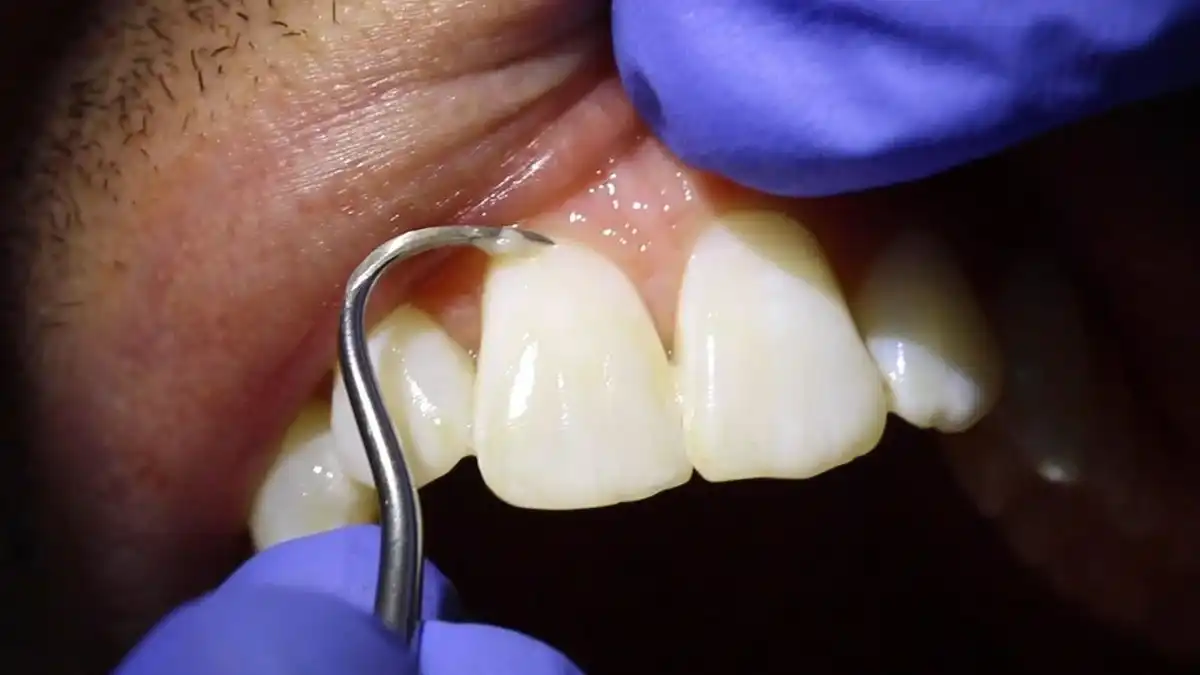Does Scaling Teeth Damage Teeth?


Have you ever wondered what that “scraping” sensation is when you’re getting your teeth cleaned? The technical term is “scaling teeth”. Your hygienist is using specially shaped curettes and hand scalers to clean your tooth enamel of any tartar buildup, plaque, or localized stain. Scaling teeth is completely safe — so long as it’s performed by a dental professional — but not done properly, there are serious teeth scaling side-effects you need to be aware of.
What Is Scaling
Scaling teeth involves using special dental tools to safely lift buildup off your tooth enamel and dentin (the tooth surface just below the gums.) Your teeth are actually harder than the scalers, so it doesn’t damage your tooth enamel to have it professionally cleaned.
Does Teeth Scaling Damage Tooth Enamel?
The only way you would experience unwanted teeth scaling side effects is if it’s done improperly. Even a toothbrush can wear away your enamel or gums if it involves heavy back and forth scrubbing day after day. But as long as toothbrushing and things like scaling teeth are performed correctly, you’ll actually be enjoying improved health, cleaner teeth, and a brighter smile for the years ahead.
In fact, it’s more damaging to your smile not to have routine dental cleanings than it is to have your teeth scaled. Because without professional scaling, teeth accumulate heavy amounts of tartar buildup. And tartar contributes to gum disease, which ultimately leads to tooth loss.
Side Effects Of Scaling Teeth
Let’s pretend for a minute that you’ve purchased one of those “dental tools” at the grocery store or teeth cleaning kits online. Although they’re different than the professional-grade instruments used in your dental office, they look quite similar. Basically, you’re buying a sharp metal toothpick with a cutting edge on it.
When hygienists start scaling teeth, they spend hundreds of hours of practice under the supervision of experienced dental professionals. But in this case, anyone can attempt scaling teeth by looking in a mirror. The most serious teeth scaling side effects that could happen include:
- Gum lacerations
- Tartar being shoved up under the gumlines
- Soft tissue damage and infection
- Enamel removal (if excessive scaling is performed in one area on a repeated basis)
- Pulling out dental work, such as crowns or bonding
- Your hand slipping, causing cuts to your lips, cheeks, or tongue
- Undiagnosed oral diseases since you’re skipping checkups, leading to…
- More expensive dental needs in the future, and…
- No professional oral cancer screenings or diagnostic x-rays
Benefits Of Scaling
Detailed, gentle teeth scaling helps you keep your teeth free of heavy buildup and stain. If you were to skip your dental checkups, you would see a shelf of tartar start to cover your teeth or fill in the spaces in-between them. With a scaler, your hygienist is able to effectively remove all of those deposits of bacteria, giving you a healthier oral environment and a blank slate to work with until your next dental checkup.

Your hygienist or dentist can efficiently clean your teeth in about an hour, give or take, depending on how much buildup you have, your age, and if you’ve had gum disease in the past. Nobody would be able to do that properly on their own without the right training. It’s just not possible! Plus, your hygienist will follow up with a polishing tool to remove any residual stain particles, plaque, and leave your mouth feeling extra clean.
One of the biggest advantages of regular cleanings and checkups is that your dentist and hygienist can help you intercept issues when they’re first starting to develop. Such as weak or demineralized tooth enamel, gingivitis, an area that needs a little more attention between checkups, or a small cavity that you need to fill ASAP. If you think you can clean your teeth at home just fine, you still won’t be getting a professional exam or oral cancer screening like you need to stay healthy. Plus, if you have dental insurance, your cleaning and checkup are usually covered at or close to 100%.
Don’t Scale Your Own Teeth!
Teeth scaling side effects are practically non-existent, except for when it’s performed by a non-licensed dental professional. Remember, they’re sitting you back and using special lights, mirrors, and sometimes even magnification equipment so that they can easily see all areas of your mouth. If you’re operating blindly or accidentally slip a sharp scaler under your gums, it can cause permanent damage. You might even find that you need a few stitches! And heaven forbid you to rub the scaler excessively over one area of tooth enamel day after day after day…it could actually erode your tooth (just like overzealous toothbrushing.) When you’re only cleaning above the gumlines, only have the job is getting done. Most disease-causing bacteria are right at or under the surface of your gum tissues.
Like I said, if you’re scaling teeth on your own, you’re not going to have the same line of sight that a professional does. And with all of those slippery surfaces, it really is just a matter of time before you slip and cut your gums. Or something worse.
How Often Should You Have Your Teeth Scaled?
People with healthy teeth and gums typically benefit from a professional cleaning every six months. Scaling teeth regularly prevents heavy tartar buildup under the gums, which reduces your chances of periodontitis and tooth loss. Your tooth enamel is strong, but not invincible. Without a professional cleaning or teeth scaling, side effects can be far-reaching.
A Note About Electric Scalers
Ultrasonic scalers use a smooth, rounded metal tip (instead of a sharp one) and high-powered frequency with water to blast away heavy tartar buildup. Ultrasonic instruments are safe and effective when used by a trained dentist or hygienist. Depending on your dental provider's preference and how much buildup you have, they may switch between a powered scaler or a manual one.
Teeth Scaling Recap
You don’t need to be worried about teeth scaling side effects, as long as you’re having your teeth cleaned by a licensed dentist or hygienist. However, scaling teeth can be dangerous and harmful to your gums and tooth enamel if you are using a “DIY” version at home. It’s not safe and it’s definitely not effective. Especially considering the hundreds of hours of training that your dental providers go through to learn how to scale teeth properly. Book a checkup every six months to have your teeth cleaned by a professional.

Make your inbox smile!
Subscribe






